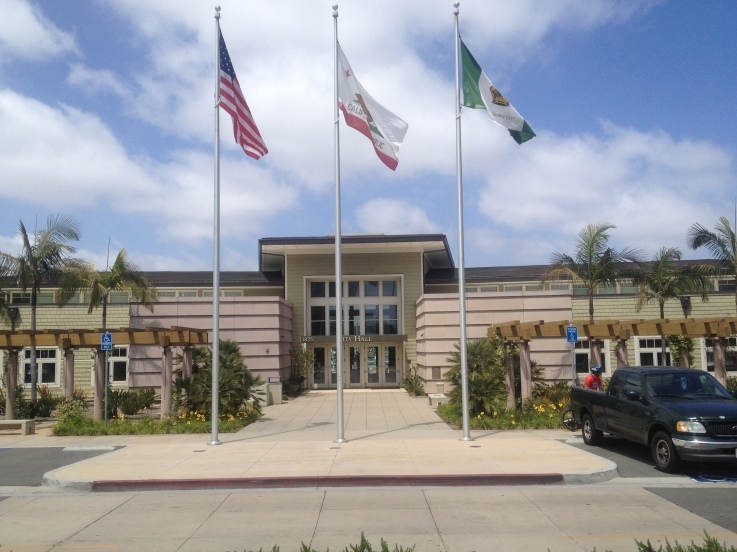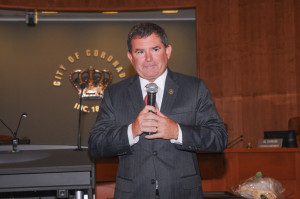 At its November 17 meeting the council will discuss creating a group to participate in drafting an Airport Land Use Compatibility Plan (ALUCP). The Airport Authority will base its plans on the Air Installation Compatible Use Zones (AICUZ) the Navy issued in 2011. The proposed list includes the Coronado Real Estate Association, The Coronado Historical Association, property owners, elected officials and more importantly the Hotel del Coronado.
At its November 17 meeting the council will discuss creating a group to participate in drafting an Airport Land Use Compatibility Plan (ALUCP). The Airport Authority will base its plans on the Air Installation Compatible Use Zones (AICUZ) the Navy issued in 2011. The proposed list includes the Coronado Real Estate Association, The Coronado Historical Association, property owners, elected officials and more importantly the Hotel del Coronado.
Del management has been vocal in its opposition to AICUZ and has insisted on having a say in the draft ALUCP. Two weeks ago, William J. Dodds, vice-president of the Hotel del Coronado wrote a scathing letter to Thella F. Bowens, CEO of the San Diego Regional Airport Authority demanding to be “involved in the process” after he claimed to have learned from “third-hand sources” that the authority had been working on the draft since last summer.
“We are extremely disappointed that we only indirectly heard of the undertaking,” Dodds wrote. “You assured me in your September 19, 2014 letter that we would be involved in this process.” Besides demanding inclusion, the letter listed a number of objections the Del has to AICUZ: “[It] fails to comply with the Navy’s own instructions for preparing any air installation compatible use zones study and ignores all NAS North Island operational facts and history….”
The report recommended placing more than 400 homes and several businesses, including the Del, in an Accident Potential Zone (APZ) (a designation that doesn’t permit homes or the types of businesses that are there now) due to safety considerations. This recommendation is despite the fact that in 45 years no plane taking off or landing at North Island has ever crashed in Coronado, as Dodd’s letter points out.
Under a state law passed in 2002, the Airport Authority and Coronado’s general plan must comply with AICUZ.
The Knight Act, as it is generally known, was an attempt to discourage cities from developing property too close to military air bases, a situation that clearly doesn’t apply to Coronado. The naval air station was established here in the 1920’s. The Hotel del Coronado was built in 1888. “Coronado was here first, so it’s not the city encroaching on the Navy. It’s the Navy encroaching on the city,” City Councilman Mike Woiwode said when the report was issued.
This is not the first AICUZ. The Navy issued two previous ones, in 1979 and 1984. The APZ in those reports didn’t included businesses or residences near the ocean, leading many to ask what has changed. So far the Navy hasn’t had an answer.
If the ALUCP follows the current AICUZ guidelines it would have “devastating economic consequences on numerous individual property owners as well as the City of Coronado as a whole” Dodds wrote. Having a working group of major stakeholders from Coronado involved in the processes is critical to addressing these concerns voiced by the Del and many others in the community.

Traffic issues along Third and Fourth Streets continue to resonate with the council. Bill Sandke is the latest council member to suggest an agenda item to help alleviate traffic problems. Councilwoman Carrie Downey suggested a free shuttle service to get people out of their cars. Councilman Richard Bailey proposed a study to see if left turns on Third Avenue would slow traffic and improve safety between the bridge and Orange Avenue corridor. Both plans have been discussed and approved by the council.
Sandke’s plan calls for placing speed cameras in the corridor. In his letter he points out that “139 communities in Illinois, Maryland, Oregon and Washington have programs in place.” California is not among them because state law forbids their use.
Establishing a speed camera program requires finding a legislator willing to propose a bill. Sandke suggests that the council direct the city’s lobbyist to do exactly that. “The legislation would highlight the unique nature of [Coronado’s] traffic patterns imposed upon our town by the state in the late 1960s and reinforce the incompatibility of state highway speeds along what is clearly a residential corridor heavily impacted by traffic,” wrote Sandke.
If the rest of the council agrees, his proposal will be agendized at a future council meeting for further discussion and a vote.
City Manger Blair King will present the new fee schedule for bicycle infractions, such as riding on the sidewalk, blowing past a stop sign, or, if you’re under 18 years old, riding without a helmet. The first violation is $85, the second $105 and the third $130. Each includes an $80 court fee, greatly multiplying the cost of the current modest fines that range from $5 to $50. The city council approved the new fees in September and they will go into effect on January 1, 2016.
The council will also vote on banners for the Coronado Film Festival, hold a public meeting on Mills Act requests, and honor the winners of the annual Thanksgiving Poster Coloring Contest.
The City Council will meet in the council chambers at 1824 Strand Way at 4:00 p.m. on Tuesday, November 17.




